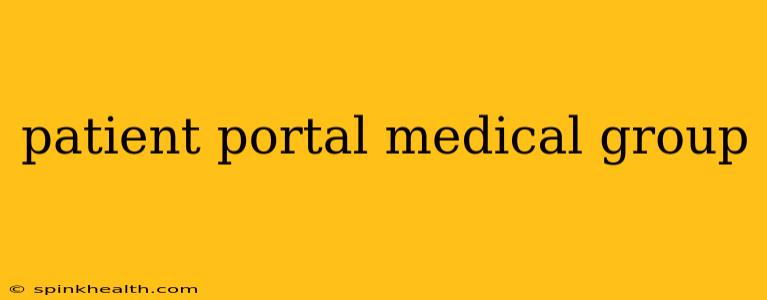The modern healthcare landscape is increasingly digital, and at the heart of this transformation is the patient portal. These online platforms are revolutionizing how we interact with our medical groups, offering convenience, efficiency, and enhanced control over our health information. But with so many variations, understanding how to best utilize a patient portal can feel overwhelming. This guide will walk you through the essentials, answering your frequently asked questions and empowering you to fully leverage this valuable tool.
What is a Patient Portal?
Imagine having a 24/7 connection to your medical group, right at your fingertips. That’s the essence of a patient portal. It's a secure online application provided by your healthcare provider, allowing you to access your medical records, communicate with your doctors, schedule appointments, and more – all from the comfort of your home or on the go. Think of it as your personal health hub, connecting you directly to your healthcare team.
How Do I Access My Patient Portal?
Accessing your patient portal typically involves a simple process. Your medical group will provide you with instructions during your first visit or you can find login information on their website. You'll usually need a username and password, which might be created during registration or provided directly by the practice. Many portals offer multi-factor authentication for enhanced security, adding an extra layer of protection to your sensitive health data.
What Information Can I Find on a Patient Portal?
This is where the real power of patient portals shines. You can typically access a wide range of information including:
- Medical Records: View your medical history, lab results, immunization records, and medication lists.
- Appointment Scheduling: Book, reschedule, or cancel appointments with ease.
- Messaging: Communicate directly with your healthcare provider's office, asking questions or clarifying information. This is particularly helpful for non-urgent matters.
- Billing Information: Review bills, make payments, and download statements.
- Prescription Refills: Request refills for your medications, often avoiding phone calls.
What if I Don't Have Internet Access?
Lack of internet access shouldn't prevent you from benefiting from the services offered by your medical group. Many practices understand this digital divide and offer alternative methods for accessing information or communicating with the office. This might include phone calls, in-person assistance, or printed copies of relevant documents. Always reach out to your medical group to discuss your options.
Is My Information Safe on a Patient Portal?
Security is paramount. Reputable medical groups utilize robust security measures to protect your private health information. These measures often include encryption, firewalls, and strict access controls to prevent unauthorized access. Your data is subject to the same privacy laws (like HIPAA in the US) that protect your medical information in other settings. However, it's crucial to use strong passwords and be vigilant about potential phishing attempts.
Can I Use a Patient Portal to Discuss Urgent Medical Issues?
No. Patient portals are convenient for non-urgent matters. For urgent medical concerns, always contact your doctor's office directly by phone or seek immediate care at an emergency room or urgent care facility. The portal is a tool for managing your routine healthcare, not for handling immediate medical crises.
How Do I Choose the Right Patient Portal for My Needs?
The "best" patient portal is the one offered by your healthcare provider. While different portals might have slightly varying features, they all aim to provide secure access to your health information and streamline communication with your medical team. Focus on understanding the features provided by your specific medical group's portal and how to effectively use them.
What if I have trouble accessing my patient portal?
If you encounter any difficulties, don't hesitate to reach out to your medical group's administrative staff. They're there to help you navigate the system and troubleshoot any issues you may face.
In conclusion, patient portals are transforming the patient-provider relationship, offering a convenient and efficient way to manage your healthcare. By understanding their capabilities and limitations, you can maximize their benefits and take control of your health journey. Remember, communication with your medical group is key to a successful experience.

